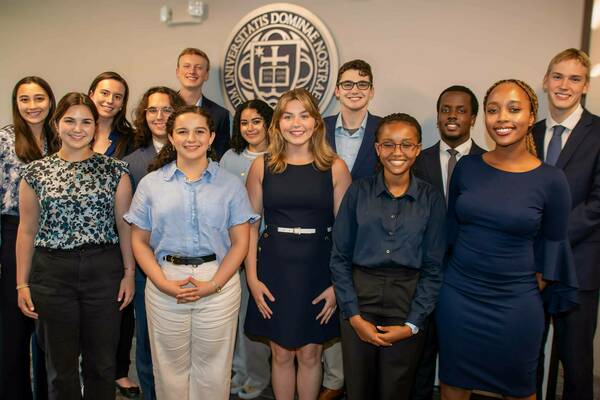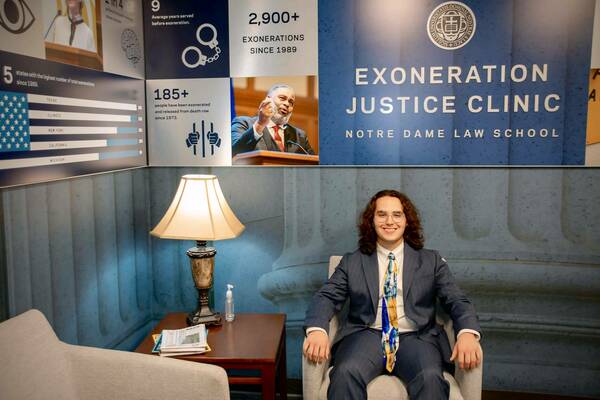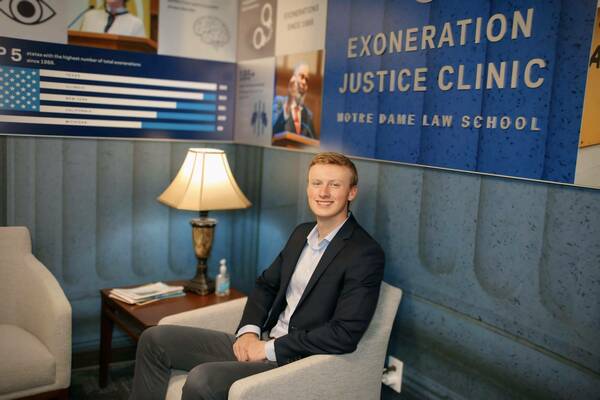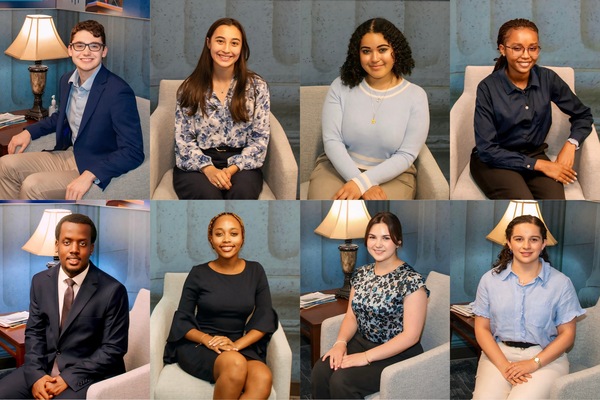
Over the summer, Notre Dame Law School's Exoneration Justice Clinic (EJC) welcomed 13 student interns from Notre Dame and beyond, marking the largest number of students in the EJC’s summer internship program since its founding. The interns worked primarily on intake cases, allowing them to review several requests for legal representation and make recommendations on whether to accept or reject cases based on a rigorous screening process. In addition, the interns were assigned to assist in ongoing EJC cases, providing them with a comprehensive understanding of the overall process of building a case.
This summer’s cohort of EJC interns included second-year Notre Dame Law students, Sydni Hart, Alexandra Ragland, Peris Munene, and Andrew Zimlich; undergraduate Notre Dame students, Anacatalina Sacher, Kaili Cuenca, and Connor Kaufmann; undergraduate St. Olaf College students, Addie Raum, Andrew Baker, Matthew Conroy, and Emme Vering; and Strathmore Law School exchange students, Nelly Irungu and Kwezi Mpyisi, from Nairobi, Kenya. The interns were split into four teams, each evaluating two cases over the summer.
“The Exoneration Justice Clinic is drawing attention well beyond the Law School,” said Professor Jimmy Gurulé, founder and director of Notre Dame Law School’s Exoneration Justice Clinic. “The work that we’re doing is being recognized on a much broader scale, and it’s attracting interest from undergraduate students at Notre Dame, outside of Notre Dame, and even law schools outside of the country.”
Gurulé added, “Other departments see the value of their students participating in the EJC, predominantly students who are planning on going to law school after they obtain their undergraduate degree. These students are realizing the importance of the work that we’re doing and how it will assist them in the process of applying to law school.”

Of the 13 student interns, two undergraduate students were sponsored by the Political Science department at Notre Dame. Connor Kaufmann, a Glynn Family Honors Program scholar and undergraduate junior majoring in History and minoring in Theology, was sponsored by the University of Notre Dame’s Institute for Latino Studies. He received academic credit for his participation in the EJC’s summer internship program through the Institute’s Cross Cultural Leadership Program course. For Kaufmann, the EJC internship was a life-changing experience.
“As a future Latino attorney, this internship not only solidified my dream of attending law school, but it also provided me with both an inside look into what law school would be like and the tools needed to succeed once there,” said Kaufmann. “The most impactful experience of my internship was being able to visit one of our clients in prison, because for the first time, it allowed me to see our client, not as a name on a page, but as a person with the same human dignity as everyone else.”
Gurulé stated that he was initially reluctant to admit undergraduate students to the EJC due to their lack of legal training. However, his concerns were immediately laid to rest after the first group of undergraduate students began working in the program. “Their enthusiasm, passion, and work ethic more than compensate for their lack of legal training. Undergraduate students are making a positive and invaluable impact on advancing the mission of the EJC,” said Gurulé.

Just as the EJC has greatly benefited from the work of undergraduate students, the students have also benefited from participating in the EJC’s program. Two student interns, including second-year law student Andrew Zimlich, first participated in the program as undergraduate seniors and later participated in the program this summer as law students. They will continue their work with the EJC this academic year.
Zimlich said, “Working at the Exoneration Justice Clinic has given me the unique opportunity to serve as a visible source of hope for another human being whose freedom has been stolen. When I was able to sit across from one of our clients in prison this summer and promise them that we were fighting for their innocence, I felt that I was putting my legal education to its greatest possible use.”
The main responsibility of the interns was to assist the clinic in deciding which cases to accept for legal representation, primarily by reviewing requests that the EJC received from Indiana prison inmates. The interns evaluated the inmates’ claims of innocence to determine their credibility. They assessed whether or not the EJC could prove the inmates’ actual innocence and explored potential avenues that the clinic could pursue to prove their innocence. To conduct their preliminary evaluations, the interns used a comprehensive intake process, developed by the EJC, that is guided by about a dozen objective factors and criteria. After conducting their evaluations, the interns reviewed correspondence, a detailed questionnaire from each inmate, and trial transcripts to look for evidence of wrongful conviction.
The interns then prepared detailed recommendation memos for Gurulé and the clinic’s attorneys to review, allowing them to enhance their legal writing skills. The clinic also held intake meetings, where the interns delivered an oral presentation to defend their recommendation.
In addition, they had the opportunity to visit one of their clients in prison to give updates on the progress of their case. Some interns also drafted legal pleadings and assisted in filing them. The program, overall, offered the interns a deeply enriching and diverse learning experience, equipping them with fundamental legal skills that will be invaluable to their academic and professional careers, whether or not they attend law school.
Learn more about Notre Dame Law School’s Exoneration Justice Clinic at exoneration.nd.edu.

Reflections from the Exoneration Justice Clinic Interns:
Andrew Baker
St. Olaf College Undergraduate Student, Class of 2026
History and Political Science Double Major with International Relations Concentration
“The EJC provided me with an enriching experience this summer. I worked with peers and the clinic staff and learned how foundational legal concepts apply to post-conviction law. This, alongside conversations garnering advice and motivating attitudes, has steered me towards applying to law school.”
Kaili Cuenca
University of Notre Dame Undergraduate Student, Class of 2025
Political Science and International Economics Double Major
“Being able to receive mentorship from the EJC’s staff attorneys, meet with a client, and do substantive research and investigation on current and potential cases was an incredible experience that has cemented my decision to apply to law school this year. Working with the PDM (“Program for the Defense of Mexican Nationals in Criminal Matters in the United States”) specifically was very special because it allowed me to explore how the U.S. criminal justice system and immigration system interact.”
Sydni Hart
Notre Dame Law School J.D. Candidate ‘26 and Exoneration Justice Clinic Student
“Working for the EJC this summer was an incredibly enriching experience. We were afforded the opportunity, not only to work on intake cases, but also, to help with ongoing cases, which was very engaging. Personally, my favorite part was the field experience we gained through attending trials, visiting the prison, and going along on investigations. Overall, it was a completely excellent summer!”
Nelly Irungu
Strathmore Law School Exchange Student, Class of 2026
“Through this experience, I have been able to draw parallels between our criminal justice system in Kenya and the criminal justice system in the United States, see the shortcomings of both systems, and learn how both systems can be improved.”
Kwezi Mpyisi
Strathmore Law School Exchange Student, Class of 2026
“This has been a valuable experience because I’ve been able to interact with the different students who are also taking part in the Exoneration Justice Clinic. This has allowed me to learn from them, as well as learn about ways to improve the criminal justice systems both in the U.S. and in Kenya.”
Peris Munene
Notre Dame Law School J.D. Candidate ‘26 and Exoneration Justice Clinic Student
"The Notre Dame Exoneration Justice Clinic widened my perspective on criminal law, and also gave me the invaluable experience of client interaction. The most memorable part of the internship was not reading trial transcripts or online investigation, although that was fascinating in its own way, but instead was the interactions I had with people. I may forget the first trial transcript I read, but I will never forget my first prison visit or my first interaction with a witness. Every great lawyer requires interpersonal skills and that is what the EJC offers that cannot be taught in a classroom.”
Adeline “Addie” Raum
St. Olaf College Undergraduate Student, Class of 2026
Political Science Major
“I came into the EJC with a naive view of the justice system — good, bad, and the occasional mistake. My summer at the EJC opened my eyes to the complicated and elaborate reality that players on all sides of the system navigate. At the EJC I learned to embrace the complicated and fight for truth.”
Anacatalina Sacher
University of Notre Dame Undergraduate Student, Class of 2025
Political Science and History Double Major
“I really enjoyed my summer experience at the EJC. I feel privileged that I was able to do meaningful work that affected peoples’ lives. My work this summer also confirmed for me that I want to go to law school.”
Originally published by at law.nd.edu on August 27, 2024.